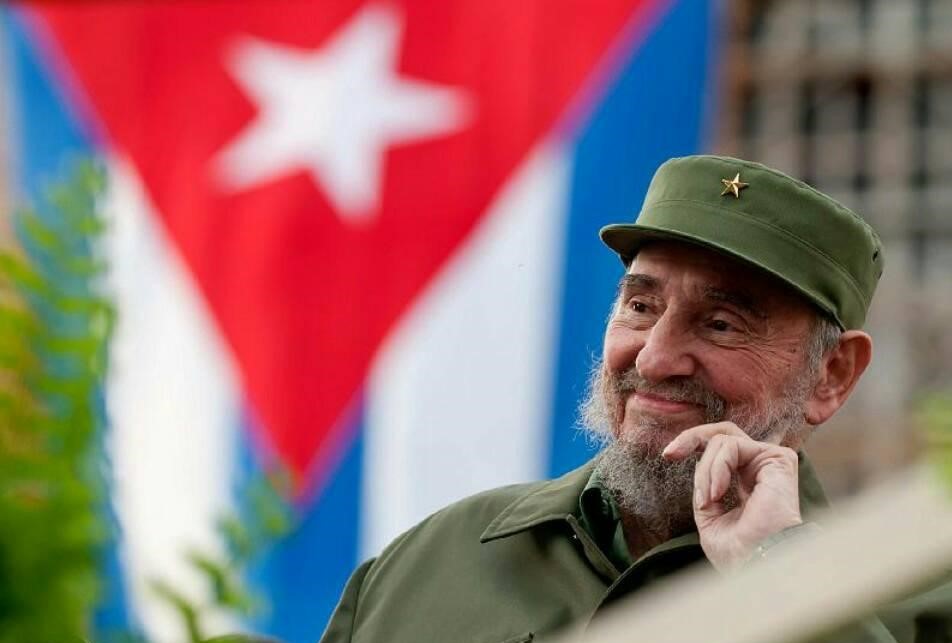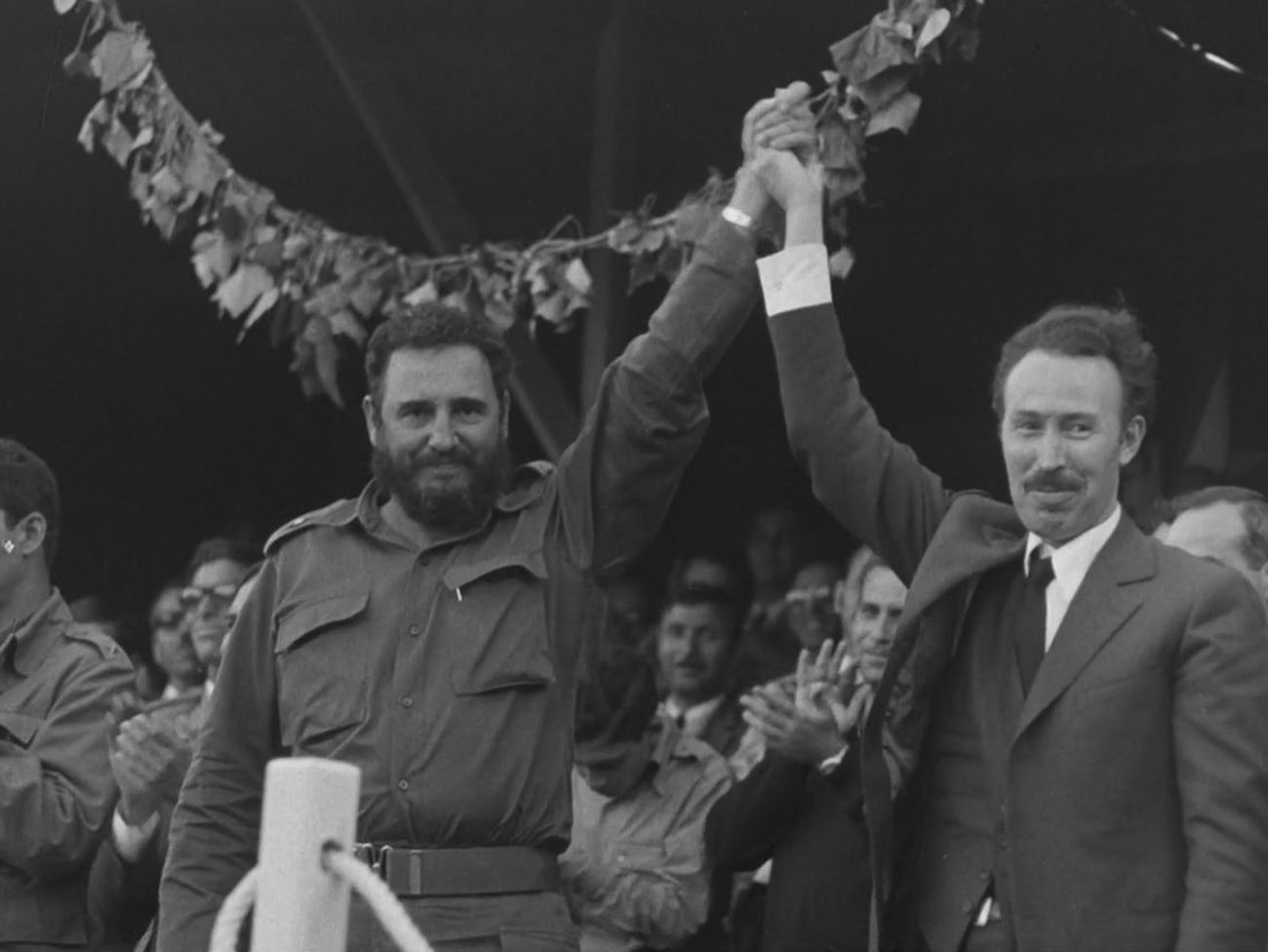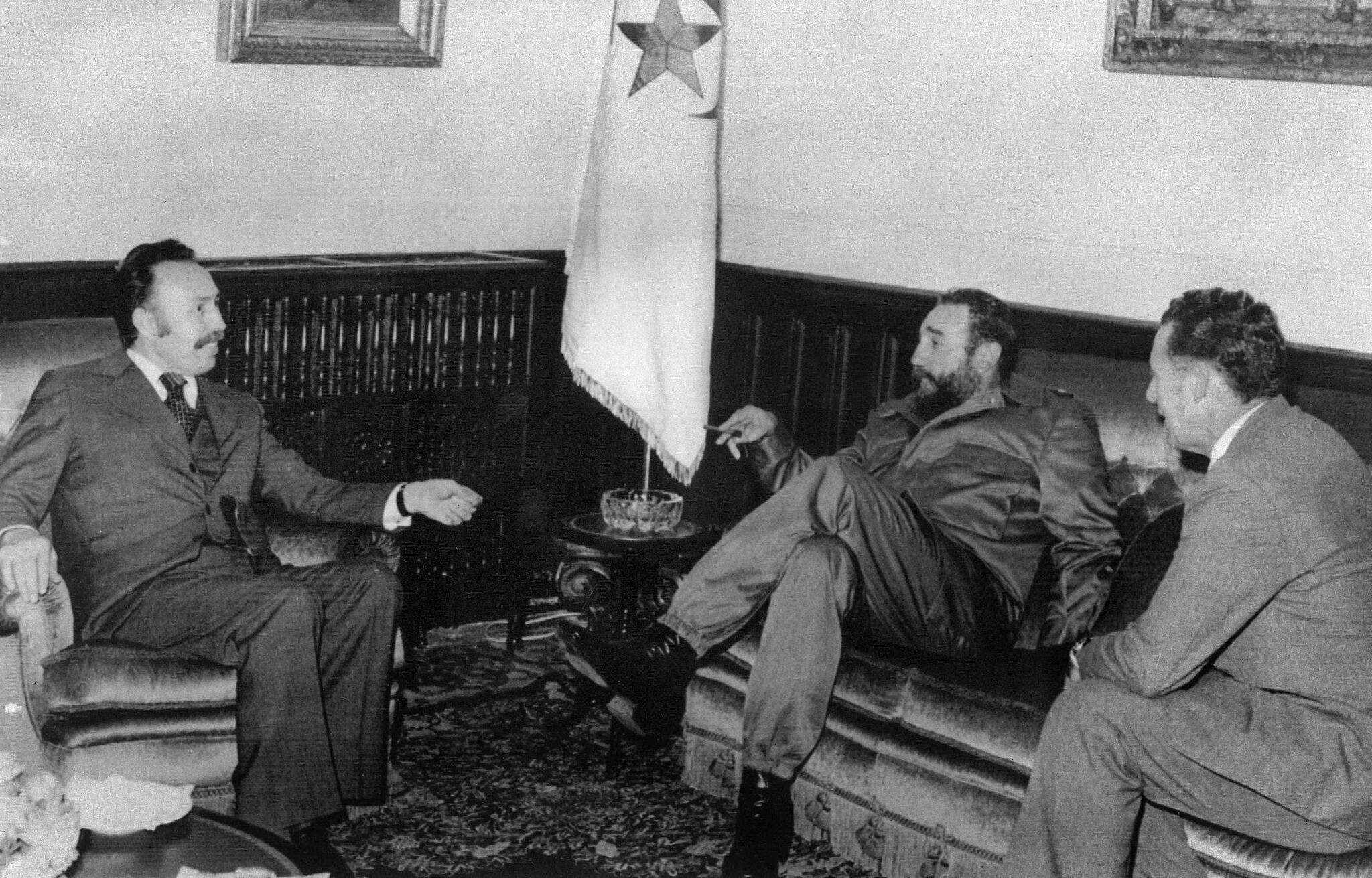BY: Dr. Hana Saada
ALGIERS- The Embassy of the Republic of Cuba in Algiers organized a commemorative event at its headquarters to mark the seventh anniversary of the passing of the iconic leader of the Cuban Revolution, Fidel Castro. The ceremony, held in Algerian capital Algiers, saw participants engage in reflections on Fidel’s life, accompanied by an exhibition featuring photos and videos portraying various aspects of the revolutionary leader’s journey.
Ambassador Commemorates Fidel Castro’s Legacy: A Call for Justice and International Solidarity
In the emotionally charged commemoration event, the Cuban Ambassador to Algeria, Armando Vergara Bueno, expressed profound gratitude for the attendees and delved into the enduring legacy of Fidel’s life.
The Ambassador highlighted Fidel’s multifaceted roles as a fighter, politician, strategist, statesman, and exceptional human being, emphasizing his tireless dedication to championing just causes globally. Central to Fidel’s teachings was the concept of not remaining indifferent to any injustice or manifestation of exploitation, a principle resonating strongly with the ongoing plight of the Palestinian people facing the brutal aggression of the Zionist regime in Gaza and the occupied territories.
Drawing attention to Fidel’s historic support for Algeria’s independence, the Ambassador recounted Fidel’s words in 1963, emphasizing that Cuba stood ready to provide whatever assistance Algeria needed. Fidel’s extensive visits and deep affection for Algeria, rooted in its unparalleled struggle for independence, were underscored.
The Ambassador further recounted Fidel’s unwavering support for liberation movements across Africa, where Cuban revolutionary forces stood shoulder to shoulder with fighters from MPLA, SWAPO, and ANC, playing a pivotal role in ending apartheid in the southern African region.
Fidel’s resolute backing of the Sahrawi people’s right to self-determination and independence was emphasized, highlighting his solidarity with their heroic struggle. The Ambassador drew parallels between Fidel’s collaborative efforts with Commander Hugo Chávez Frías in promoting the Bolivarian Alliance for the Peoples of Our America and ongoing endeavors to foster cooperation between nations.
Regarding the current atrocities in Palestine, the Ambassador echoed Fidel’s firm stance in defending the just cause of the heroic Palestinian people, condemning the Zionist genocide in Gaza. Fidel’s historic words condemning the expulsion, persecution, and genocide committed by imperialism and Zionism against the Palestinian people were reiterated.
In paying homage to Fidel’s enduring principles, the Ambassador emphasized the legacy of unlimited fidelity to principles, honor, and the steadfast refusal to betray the ideals for which Fidel dedicated his entire life.
Fidel’s practice of internationalism, epitomized by the presence of over 870 Cuban healthcare professionals in Algeria and a medical brigade in Sahrawi refugee camps, totalling 25000 professionals in 56 countries, was acknowledged. The Ambassador concluded by noting that seven years after Fidel’s physical departure, his legacy remains ingrained in the hearts of the Cuban people and millions worldwide. Fidel’s unwavering faith in victory and commitment to just causes continues to guide the path forward.
In a final tribute, the ambassador said, “Thank you, Fidel. Always onward to victory. Homeland or death, we shall overcome.” The commemoration served as a poignant reminder of Fidel Castro’s indelible mark on history and his ongoing influence in the pursuit of justice and equality.
Algeria-Cuba Diplomatic Relations and Support for Palestine Emphasized in Exclusive Interview with Dzair Tube
In an exclusive statement to Dzair Tube, the Ambassador underscored Cuba’s unwavering support for the Palestinian cause and the people’s struggle to attain their legitimate rights. He highlighted a pivotal historical moment on September 9, 1973, during the Fourth Summit of Non-Aligned Countries in Algiers, where Fidel Castro declared the severance of diplomatic ties with the occupying entity. Today, Cuba maintains no diplomatic relations with Israel, a decision made to support the just Palestinian cause and other equitable Arab issues.
Addressing the Algeria-Cuba relationship, the Ambassador emphasized the occasion as an opportunity to reaffirm the robust ties that extend back to before Algeria’s independence. He mentioned the recent celebration of the 61st anniversary of Algerian-Cuban relations, expressing optimism about substantial collaboration prospects. The Ambassador noted significant potential for cooperation in various fields, including healthcare, energy, tourism, culture, and sports. He highlighted the remarkable work of the Cuban medical team in Algeria, providing exemplary services to the brotherly Algerian people.
Furthermore, the Ambassador stressed mutual eagerness to enhance these relations, pointing out the Cuban side’s readiness to contribute actively to the shared goals of both nations. The interview encapsulates the depth of diplomatic ties between Algeria and Cuba, reflecting a commitment to further collaboration for the benefit of both nations.
Algeria Mourns the ‘Friend of the Peoples’ Fidel Castro
:quality(70)/cloudfront-eu-central-1.images.arcpublishing.com/liberation/YZGWYOBZEFRVMQAH62TUMUU56E.jpg)
In the wake of the announcement of the death of Fidel Castro, the former Cuban leader and historic partner of independent Algeria, Algiers has declared eight days of national mourning. The capital city was draped in somber hues as flags on official buildings flew at half-mast. The mourning period signified the profound loss felt by Algeria, marking the end of a significant chapter in the enduring friendship between the two nations.
The friendship between Algeria and Cuba traces back to the era of Algeria’s struggle for independence. In the most challenging moments of its history, Fidel Castro’s Cuba extended a friendly hand to Algeria, forging a bond that withstood the test of time. In 1963, responding to a call from Algeria, Fidel Castro sent Cuban doctors to replace departing French medical professionals, solidifying a bond that endures to this day. Additionally, a poignant example occurred during the “Sands War” (October 1963-February 1964), when Morocco, led by Hassan II, attempted to militarily aggress Algeria to annex a part of its territory. Fidel Castro responded by sending artillery, planes, armored vehicles, and even a contingent of several hundred men to support the Algerian struggle. Algeria expressed profound gratitude, and Algiers became a pivotal support base for liberation movements in Latin America. Fidel Castro was triumphantly welcomed in 1972, engaging in a memorable parade with President Houari Boumediene through the streets of Algiers, capturing an endearing moment where Castro affectionately caressed a child’s head amid the crowd.


Fidel Castro’s Enduring Legacy: Champion of Palestinian Liberation and Global Resistance

Fidel Castro distinguished himself by unequivocally supporting the Palestinian revolution. He provided support to the Palestine Liberation Organization (PLO) and embraced the martyr Yasser Arafat, one symbol of the Palestinian struggle, until his martyrdom. Castro consistently aligned with the liberation principles and the determined resolve to defeat occupation, injustice, and tyranny. He wholeheartedly assumed the roles of a Palestinian revolutionary and a national leader, solidifying the bond between Palestine and Castro. This historical connection stands as a genuine symbol of liberation leaders united against hegemony, domination, and racism.

Fidel Castro’s Revolutionary Journey and Impact on Global Politics
Castro’s leadership was marked by wisdom, strategic plans, and an ambitious vision, making him a global symbol of resistance. He steadfastly pursued his goals, preserving his comrades in the struggle and never compromising their principles. Castro’s clarity of purpose is evident in building both the revolutionary and civilized aspects of Cuba. He consistently urged everyone to bear the responsibility of continuous diligent work and active participation, yielding positive results.
Castro’s life indicates that aspirations for a better future do not negate revolution and its continuity. Perseverance in the struggle is a permanent feature that propels the insurgent and the free to give their all for their homeland. This historical mission, recorded by the past, present, and future, is transmitted across generations with credibility, testifying to steadfastness.
Despite numerous attempts by the United States, with over 638 failed assassination plots, Castro’s legacy as a resilient leader endures, marking the seventh anniversary of his passing.
Key Milestones in Castro’s Revolutionary Struggle:
Castro played a leading role in the Cuban Revolution against the dictator Fulgencio Batista, who had the support of Washington. From his early years, Castro embraced leftist ideas and resistance against imperialism.
From his early youth, Fidel Castro embraced leftist ideologies and anti-imperialist sentiments while studying law at the University of Havana. Engaging in rebellious movements against right-wing governments in the Dominican Republic and Colombia, Castro planned to overthrow his country’s president, Batista, through a failed attack on the Moncada Barracks in 1953, leading to his subsequent arrest.
After a year in prison, Castro traveled to Mexico, where he formed the revolutionary group known as the “26th of July Movement” with his brother Raul Castro and Ernesto “Che” Guevara.
He led the movement in guerrilla warfare against Batista’s forces from the “Sierra Maestra” region.
Castro, a charismatic lawyer and politician, held political and military power in Cuba from 1959 to 2008, serving as Prime Minister until 1976 and then as President from 1976 to 2008. He also assumed the role of the first secretary of the Cuban Communist Party from 1961 to 2011, eventually passing on his powers to his brother and fellow comrade, Raúl.
Under his leadership, Cuba transformed into a one-party communist state, nationalizing industries, businesses, and agriculture. Implementing socialist reforms for all societal classes, Castro prioritized education and healthcare, making Cuba a leader in medicine and healthcare.
Fidel Castro passed away on November 26, 2016, at the age of 90.
Failures of U.S. Attempts Against Castro:
Despite numerous strategies, including economic sanctions, assassinations, and a failed invasion at the Bay of Pigs in 1961, the United States could not oust Castro. His alignment with the Soviet Union and the Cuban Missile Crisis demonstrated his resilience against external threats.
Global Influence and Support for Liberation Movements:
- Support for Revolutionary Groups: Castro actively supported anti-imperialist revolutionary groups worldwide, aligning with the Non-Aligned Movement and backing movements like the Palestinian cause.
- Leadership Roles: Serving as Secretary-General of the Non-Aligned Movement twice, Castro opposed globalization and forged alliances, particularly with leaders like Hugo Chávez in Venezuela, forming the Bolivarian Alliance for the Americas.
- Friendship with Arab and Revolutionary Leaders: Castro maintained strong friendships with Arab and Revolutionary leaders, including the late Abdelaziz Bouteflika, Gamal Abdel Nasser, Hafez al-Assad, Imam Sayyed Ali Khamenei, Yasser Arafat and Hugo Chavez. His stance on the Palestinian cause was evident through diplomatic actions, speeches, and support for the Arab League.
- Diplomatic Actions for Palestine: Cuba condemned the Zionist aggression in the 1967 Six-Day War, consistently included Palestine in international speeches, and severed diplomatic ties with “Israel” in 1973, becoming the first country in the Americas to do so.
- Cultural Center Transformation: In 1972, Castro transformed the Zionist cultural center in Havana into an Arab Union headquarters, symbolizing solidarity with Arab communities in Cuba.
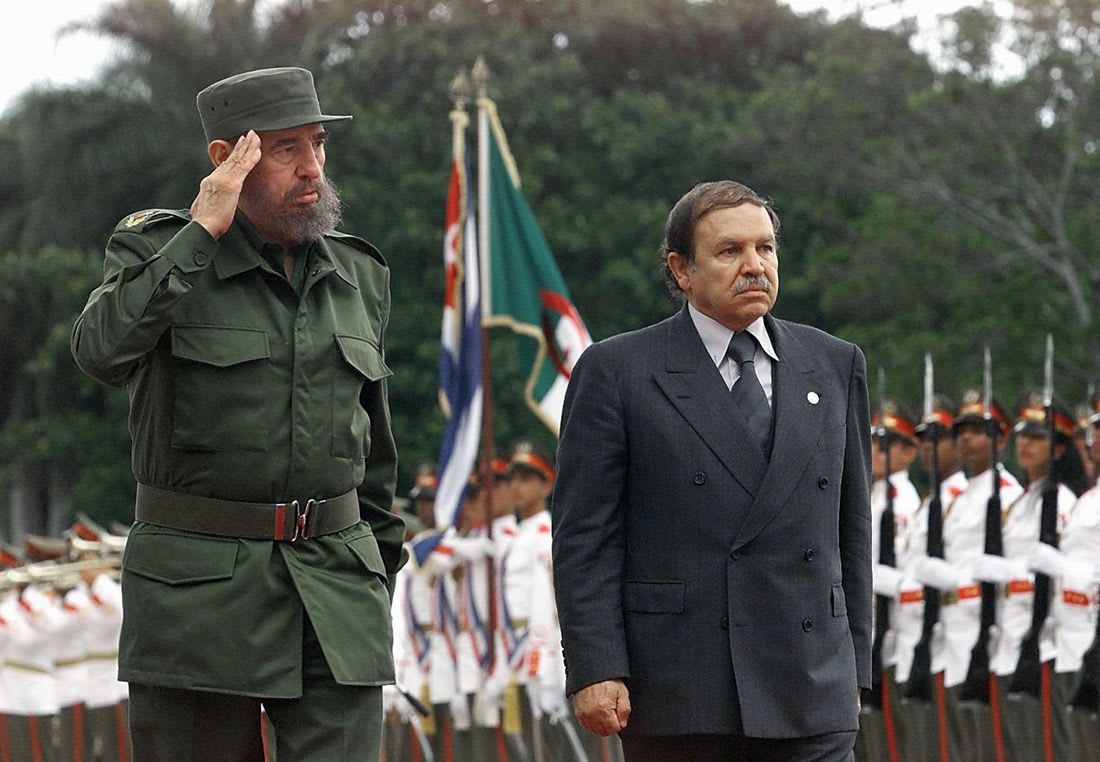


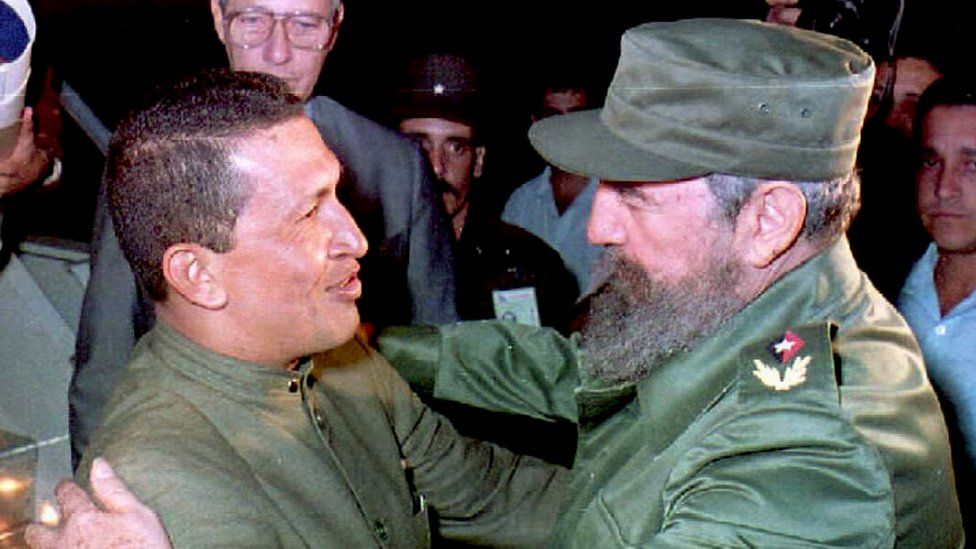


Fidel Castro’s life, marked by resistance and revolutionary fervor, left an indelible impact on global politics, inspiring movements against oppression, imperialism, and injustice. His support for Palestine and other liberation causes solidified his place as an iconic figure in the struggle for independence and justice.
To the brotherly people of Cuba and all freedom-loving individuals worldwide, we extend our heartfelt condolences on the passing of the dedicated fighter and global leader, the loyal friend of our peoples, and the steadfast companion to our leaders…. a guide for our just causes.
“Thank you, Fidel. Always onward to victory. Homeland or death, we shall overcome.”
¡ Patria o Muerte, Venceremos !
